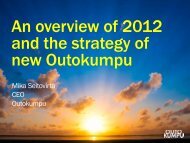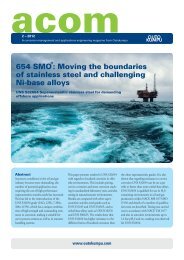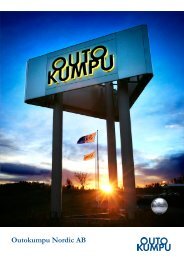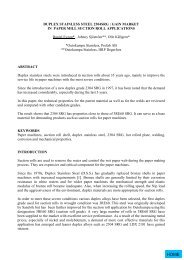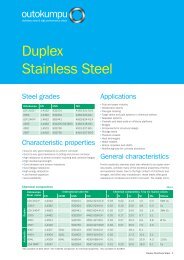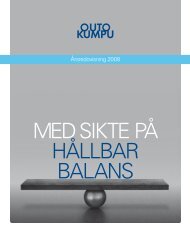Annual Report 2010 - Outokumpu
Annual Report 2010 - Outokumpu
Annual Report 2010 - Outokumpu
You also want an ePaper? Increase the reach of your titles
YUMPU automatically turns print PDFs into web optimized ePapers that Google loves.
143<br />
Operational risks<br />
Operational risks include inadequate or failed internal processes, employee actions, systems, or other events such as<br />
natural catastrophes and misconduct or crime. These types of risk are often connected with production operations,<br />
logistics, financial processes, major investment projects, projects or information technology and, should they materialise,<br />
can lead to personal injury, liabilities, the loss of property, interrupted operations or environmental impacts. <strong>Outokumpu</strong>'s<br />
operational risks are partly covered by insurances. The Group also aims to identify and mitigate possible risks and<br />
impacts on stakeholders.<br />
Risks associated with people<br />
<strong>Outokumpu</strong>'s objective is to achieve a strong and unified corporate and performance culture throughout the company's<br />
organisation. This includes improvements in productivity and the development of enhanced leadership skills among<br />
Group personnel. To further these aims, the "One <strong>Outokumpu</strong>" concept is being further developed and its integration into<br />
other operating processes has begun, but a significant culture change of this kind takes time. This change process can<br />
be viewed as an excellent opportunity to increase operational efficiency through cross-cultural cooperation between<br />
people, as country-based or overly independent corporate cultures can restrict both operational progress and the<br />
achievement of strategic goals. In <strong>2010</strong>, <strong>Outokumpu</strong> focused on leadership development through internal programmes<br />
and training. An audit of corporate performance management was also undertaken to identify future development needs<br />
in performance management processes.<br />
Risks associated with investment projects<br />
During <strong>2010</strong>, a decision was made to restart the project to double <strong>Outokumpu</strong>'s ferrochrome production capacity in the<br />
Kemi-Tornio area in Finland and an investment to increase capability and capacity at the Group's stainless steel quarto<br />
plate production facility at Degerfors in Sweden was also announced. Failures or delays in these projects would have a<br />
negative impact on strategy implementation and the achievement of financial and growth targets. Actions being taken by<br />
<strong>Outokumpu</strong> to manage these risks include the provision of dedicated resources for overall project support.<br />
Emissions allowances have indirect impacts on electricity prices<br />
<strong>Outokumpu</strong> closely monitors developments in both global and European legislation that may affect Group businesses.<br />
The European Climate and Energy Package (CEP) could have a significant impact on the European electricity market,<br />
and could therefore also affect <strong>Outokumpu</strong>'s business as ferrochrome production in particular consumes large quantities<br />
of electricity. The enforcement of EU level and national directives within the CEP is currently ongoing. This complex<br />
issue includes a number of significant uncertainties, including the precise form of final legislation and possible national<br />
compensation systems which may incorporate political elements.<br />
The risk that a high price for emission allowances will increase the market price of electricity is significant, but<br />
<strong>Outokumpu</strong>'s stake in the Fennovoima nuclear power project will help to mitigate this. Ongoing activities engaged in by<br />
the Group include the monitoring and analysis of different future price scenarios and regular coordination between<br />
<strong>Outokumpu</strong>'s business units and related corporate functions.<br />
Risks from radical changes in environmental legislation<br />
<strong>Outokumpu</strong> operates its business in accordance with prevailing laws and regulations, including developing environmental<br />
legislation. Responses to the introduction of new regulations often result in additional costs such as: the need to hire<br />
additional personnel and purchase expensive equipment for data collection and reporting; arranging additional<br />
monitoring operations; and taking action to avoid pollution and/or mitigate the ecological impact of Group production<br />
facilities and products being manufactured. In this sense, environmental legislation and the associated permits are part of<br />
<strong>Outokumpu</strong> <strong>Annual</strong> <strong>Report</strong> <strong>2010</strong> – Corporate Governance – Operational and financial risks



